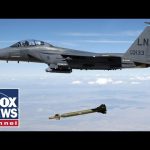In the tense world of international relations, few stories are as complicated and critical as the ongoing showdown between the United States and Iran. Recently, the situation has escalated, bringing old tensions bubbling to the surface once again. The spotlight is firmly on Iranian Supreme Leader Ayatollah Khamenei, who, despite pressures, has resolutely stated that there will be no surrender. This declaration raises eyebrows and concerns, especially among those watching closely from the U.S. and allied nations like Israel, both of which are coordinating efforts to counter the Iranian nuclear threat.
Reflecting on the past, one can’t help but draw parallels between Khamenei’s current predicament and pivotal moments from history, like the Iran-Iraq War. During that brutal conflict, Khamenei faced a tough choice when the U.S. threatened military intervention. In a moment of desperation, he famously opted to “drink the poison chalice” by agreeing to a ceasefire, a decision that saved lives but signaled a retreat. Fast forward to today, and one wonders if the Ayatollah is grappling with a similar decision. With the U.S. military presence intensifying, he might need to ponder whether to engage in negotiations or risk further escalation.
The tone of the conversation shifts when considering the consequences of Khamenei’s stubborn stance. The United States, particularly under the current administration, has made it crystal clear that this isn’t just about stopping Iran’s nuclear ambitions. There are broader implications at play. If Iran chooses to escalate tensions instead of seeking peace, military action could target not just nuclear sites, but also other military installations supporting these endeavors. It’s a high-stakes game of chess, where one wrong move could lead to disastrous results.
Meanwhile, the diplomatic landscape is anything but stable. It’s akin to standing on shaky ground while trying to juggle flaming torches—one slip, and the flames could engulf everything. As the U.S. coordinates with Israel to monitor potential threats, there remains the ever-looming question of what Khamenei will do next. Will he continue to dig his heels in and risk international wrath, or will he step back and recognize the sensible path of negotiation that has repeatedly been offered by U.S. leadership?
Ultimately, the world watches and waits. While some may view Khamenei’s defiance as a display of strength, others see it as a dangerous dance with destiny. The stakes have never been higher, and the choices he faces could make or break not only his regime but also shape the geopolitical landscape for generations. In the thick of this diplomatic drama, one can hope that cooler heads prevail, and peace becomes the ultimate goal, steering clear of the belligerence that has dictated so much of this narrative thus far.




